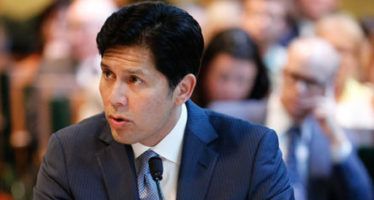Recalling Honig, A Man Of 'Conviction'
JAN. 10, 2010
By K. LLOYD BILLINGSLEY
Gov. Jerry Brown has appointed Bill Honig to the State Board of Education, explaining, “I think people can be confident that he has a contribution to make.” That may be doubted, but Mr. Honig, who withdrew his name today, is certainly a man of conviction.
While serving as state superintendent of public instruction he was convicted on four felony conflict-of -interest charges. His California Department of Education had been paying the salaries of individuals who worked for the Quality Education Project, headed by Honig’s wife.
The court sentenced Honig to four years of probation and 1,000 hours of community service and ordered him to make restitution payments of $274,754 and pay a fine of $10,800. A one-year jail sentence was suspended. Honig was forced to resign as state education boss.
The charges were later reduced to misdemeanors, but Honig remains a “risky” pick, even according to supporters. They point to his education record, but that makes him an even riskier pick for the board, on which he also served during Jerry Brown’s earlier administration.
In 1983, his first year as state superintendent, the education report “A Nation at Risk” warned that a rising tide of mediocrity threatened the very future of the nation. Honig talked a good game, criticizing textbooks and calling for tougher standards. But his main reform idea, same as the education establishment, was to call for more money.
In 1988, he was a key promoter of Proposition 98, which makes K-12 spending the biggest item in the state budget.
Also in 1988 Honig was a sponsor of Proposition 71, which would have altered state spending limits. His Department of Education published a study supporting the measure and sent pro-71 materials home with schoolchildren. Superior Court Judge Joseph DeCristoforo ordered Honig and his Department to stop using public funds to support ballot initiatives.
Honig emphasized standards, but on his 10-year watch California did not become a national front-runner. Some writers noted that if California schools were doing their job, they would not need services such as the QEP, headed by Honig’s wife. According to Peter Schrag, one of his strongest supporters, Honig was so certain that QEP services were “the best thing for the schools that got them” that he ignored warnings about conflict of interest.
After his conviction, Honig taught school in the inner city and also at the San Francisco State school of education.
Since 2005 he has been president of the Consortium on Reading Excellence, but it’s hard to call Bill Honig a reformer.
He has never been a leading supporter of charter schools, the most meaningful reform of recent years. He is not a critic of teacher unions, which Los Angeles mayor and former Assembly Speaker Antonio Villaraigosa calls a major obstacle to reform. He is not supporter of full school choice, which would allow parents and students to select schools, government-run or independent, and take their funding with them.
Bill Honig is essentially a supporter of an education establishment that shows strong evidence of being unreformable. Until parents and students can choose their schools, as a matter of basic civil rights, Californians should not expect much improvement in education
Related Articles
Corrections Realignment Without Vote
Commentary JUNE 7, 2011 By KATY GRIMES State Corrections Secretary Matthew Cate announced at a news conference earlier today that
California Democrats brace for intra-party battle after Kevin de León announces bid to unseat Feinstein
Amid intense calls from progressives for a primary opponent for U.S. Sen. Dianne Feinstein, D-Calif., state Senate Pro Tem Kevin
Brown’s drought battle heats up Sacramento
Running out of water, California officials have decided to open the taps on another resource: money. Joined by leading legislators, Gov. Jerry Brown has announced




